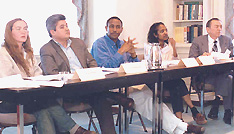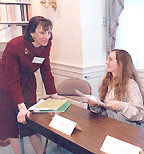
| T H E N I H C A T A L Y S T | S E P T E M B E R – O C T O B E R 2002 |
|
|
|
Grip
Strength:
|
and Philip Chen, Ph.D., Senior Advisor to the Deputy Director for IntramuralResearch
|
 |
|
Mock
Peer Review Panel (left to right): Georgia
Atella from Brazil, Vincente Baca-Ruiz from Mexico, Alassane
Dicko from Mali, Kamala
Tirumalai from India, and Philip
Chen
|
 |
|
Sharon
Hrynkow (left) and Georgia
Atella
|
It began with the misperception that women from developing countries are not as well represented in the NIH Visiting Program as their male counterparts.
After digging into the data, however, we learned that it is geography, not gender, that underlies underrepresentation in the program.
At the time we checked into it (March 2001), the striking finding was this: Of the 2,500 foreign trainees in the Visiting Program, only 20 were from sub-Saharan Africa. Moreover, other regions of the world in which the burden of disease is exceptionally high were also poorly represented: Zimbabwe, Uganda, Indonesia, Bolivia, and Kazakhstan, for example, each had only one individual on campus at that time. (As for a suspected gender imbalance, with just a few exceptions, the ratio of male to female participants from countries with per capita income less than $3,125 actually approached 1:1.)
As with many experiments, this unexpected realization led us down another road. When we considered the global burden of disease and the disproportionate share of that burden borne by the lower income countries of the world, we began to ask ourselves if we could do more to recruit postdoctoral trainees to the Visiting Program from these disease-burdened nations and help them to return home afterwards.
Based on our experience with programs sponsored by the Fogarty International Center (FIC) and the NIH extramural research program, we know that enhancing scientific infrastructure in resource-poor settings depends on people returning home after a successful training experience. So, we decided to take a look at what was happening with the Visiting Fellows on campus.
This decision led to a series of consultations with junior scientists from countries in the developing world and countries in economic transition. The results of these consultations have provided much food for thought, as well as action.
Think
Globally,
Act
Locally
FIC works with almost every NIH Institute and Center through an array of extramural research and research training programs to reduce disparities in global health; it is well positioned to work with scientists on campus who are from the developing world.
Supporting "Science for Global Health," FIC has decades of experience working with developing-country partners on research and training projects, building research capacity one scientist at a time in the fields of AIDS, maternal and child health, environmental health, and other global health challenges.
It was easy to project the value of helping to advance the careers of young scientists from developing countries after they finished their training at NIH and returned home. The objective is to potentiate their effectiveness in their home countries’ scientific communities and as part of the next generation of global health leaders.
Working closely with OIR and ORWH, FIC hosted a meeting on campus last March to hear from these future leaders how they planned to transition back to their home countries and how prepared they felt to apply for NIH extramural awards. We learned that the experiences of fellows from the developing world in many ways mirror those from the United States and other developed countries: The apprehension associated with writing a grant is universal—as is the need for mentoring and role models.
But there were also some specific differences. Many of the fellows were unaware of opportunities through FIC and other NIH mechanisms to receive grant support on return to their home country. Fellows also stressed the need for support that would enable them to network with others and among themselves on return home–the establishment of an "alumni" group, for example.
In settings in which the scientific infrastructure is weaker than in the United States, reliance on colleagues with like experience and some means of communicating from country to country emerged as key.
As a way of jumpstarting a communication network, participants suggested the establishment of an NIH ListServe of the 600-plus scientists from the developing world in the intramural program so that an easy exchange of information and experience could take place. They also emphasized the need for hands-on experience in writing grants to be able to launch their independent careers on return home.
Get a GRIP
Over the next several months, we consulted broadly across NIH, with the FIC Advisory Board, and then again with the fellows about a program that we ultimately rolled out as the Global Health Research Initiative Program (GRIP) for New Foreign Investigators.
To help launch independent research careers, the GRIP provides up to $50,000 for salary and research costs for up to five years to visiting fellows on their return home. As an RO1 mechanism, it is highly competitive and peer-reviewed through the NIH process.
The response to the GRIP Request for Applications (RFA) was enthusiastic, and the first round of awards will be made in September 2002. FIC partners in this first GRIP round were OAR, ODS, ORWH, NINDS, NIA, OBSSR, NIMH, NEI, NHLBI, NIGMS, and NIEHS.
To provide practical experience in the grant-writing process, NIGMS joined with the Office of Education to host a one-day session on how to write an NIH grant. This was open to the entire community and was well attended by fellows from the developing world.
FIC followed a few weeks later with a mock peer review session in which PIs from the University of Maryland and Johns Hopkins University in Baltimore dissected two of their own grants—one unsuccessful, and then the successful revision—using a group of 20 of the fellows as the review panel. This practical session was well received, and FIC plans to hold another such event shortly.
The second GRIP RFA will be issued in September 2002. With more NIH ICs already signing on, we expect an even greater response for the next round, as well as even more participants in the next mock peer review session.
Where Do We Go from Here?
FIC acted on the suggestion to establish and maintain a ListServe for fellows from developing countries and countries in economic transition. Another ListServe, supported by OIR, will soon be in place to connect all of the international fellows on campus.
Currently in discussion is an initiative to link visiting fellows with extramural mentors, beginning with the networks already supported through FIC and its partner ICs. OIR has actively encouraged multiple mentors, since an extramural mentor would provide an excellent complement to advice received from intramural mentors. Coming full circle, the fellows will work with FIC and OIR to boost the ranks on campus of fellows from low-income countries.
Kamala Tirumalai, a visiting fellow from India working in the Laboratory of Cellular and Molecular Immunology, NIAID, is now leading a subgroup of the fellows to explore a range of ideas and potential activities to bring to the larger group for consideration and implementation. The intramural-extramural mentoring program is one project. Another is developing ways to use home country newspapers and media outlets to disseminate information about the fellows’ research successes as a means of helping them transition homeward.
Tirumalai is optimistic
that what for many are "currently rather bleak" career prospects in
their countries of origin will be substantially boosted by the ongoing consultations
between FIC, OIR, and visiting fellows and the fellows’ brainstorming sessions—not
to mention the extramural awards. ![]()
For more information on the GRIP, contact Aron Primack, FIC, at 301-496-1653. To join the Developing Country ListServe or for information on past or upcoming meetings of the fellows, contact Chris Keenan, FIC, by e-mail or on 301-496-1415. For information about the NIH Fellows Committee (FelCom), contact Deborah Cohen at 301-402-1907.